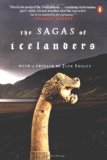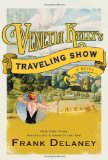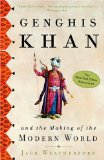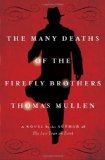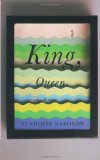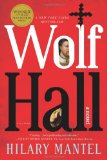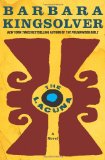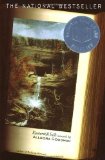Category: Book Reviews
Book Review: “The Sagas of the Icelanders” (Penguin Classics Deluxe)
March 3, 2010 { Book Reviews }The Penguin Classics Deluxe Edition collection of The Sagas of the Icelanders is imposing both for its physical dimensions (hint: doorstoppish) and its content. These prose stories, written down sometime around the 14th century or so based on happenings in the 10th century, are a mix of actual things that happened and (hopefully) apocryphal bloodbaths that surpass any horror movie I’ve seen in terms of very messy body count.
Book Review: Venetia Kelly’s Traveling Show by Frank Delaney
March 2, 2010 { Book Reviews }Frank Delaney’s most recent novel is a misty-sweet race through softcore Irish political history, country farms and criminal intrigue. We watch a father’s obsession turn into a son’s fate, in the framework of the Vaudevillian traveling show of the novel’s title character.
This book is charming: Delaney knows how to woo his Ire-phile gaga American audience, and he’s keyed right into his early-1930s setting.
Book Review: “Let the Great World Spin” by Colum McCann
February 22, 2010 | 2 comments { Book Reviews }There are so few flaws in Colum McCann’s National Book Award-winning novel about humanity and grief that it’s difficult to find a toehold for comment. McCann’s agitated, love-hungry characters weave an emotional fabric so dense that it proves tricky to unravel and examine.
It’s tempting to try to find literal ties to events in this book Esquire bills as the “first great novel about 9/11.” Set in New York city in August of 1974, Let the Great World Spin loosely revolves around George Petit’s guerrilla tightrope walk, strung between the barely-completed Twin Towers of the World Trade Center. The novel’s characters stare up at Petit’s performance awestruck, his bravery (or hubris) impacting their own personal sagas.
Book Review: “Genghis Khan and the Making of the Modern World” by Jack Weatherford
February 3, 2010 | 1 comment { Book Reviews }Out of nowhere in the early 1200s, Genghis Khan and his Mongol “Horde” swept out of central Asia and in a sort of proto-blitzkrieg overwhelmed cultures from Korea to the Ukraine, acting as a catalyst in the development of cultural elements that we take for granted. Genghis’ horseback steppe nomads didn’t excel at traditional (infantry-focused) warfare, nor did they possess skilled artisans or tradesmen. They had neither prestige nor mercantile supremacy. What they had was the ability to start afresh, without being constrained by convention, and by thinking up new things were able to change the course of world history.
Book Review: “The Many Deaths of the Firefly Brothers” by Thomas Mullen
January 27, 2010 | 1 comment { Book Reviews }Don’t worry: You won’t be bored. Thomas Mullen’s sophomore effort combines gee whiz action scenes with the historical pathos of 1930s Americana and deceptively straightforward characters in a novel that ends up feeling bigger than the sum of its parts. The story opens in 1934, the country at the pinnacle of its economic grief. The criminal brothers, Jason and Whit Fireson, have just died. They have woken up in a rural Indiana morgue, riddled with gunshots, with no memory of how they perished.
Book Review: “King, Queen, Knave” by Vladimir Nabokov
January 25, 2010 | 5 comments { Book Reviews }Nabokov’s second novel, written in the late 1920′s in Germany, traces the torpid and illusory throes of a love triangle pitting young, mawkish Franz against his rich and boisterous uncle Dreyer. Their joint target: Dreyer’s unattainable, beautiful and manipulative wife. The entire book feels like an extreme closeup, showing us the pores and pustules of humans and their delusions.
Book Review: Henry IV, Part I by William Shakespeare
January 23, 2010 { Book Reviews }Blah, blah, blah, John Falstaff, what a laugh. Blah, blah, blah, the meaning of valor and honor. The prodigal brat son repairs his ways and leads the country to implied future greatness. These are all themes that seem a bit tired in our day, but Shakespeare probably played some role in putting them together in [...]
Book Review: “Wolf Hall” by Hilary Mantel
January 14, 2010 { Book Reviews }Wolf Hall concerns in a much-studied time. Writers have plundered the intriguing reign of King Henry VIII and his storied serial wives from hundreds of angles, both academic and artistic. But Hilary Mantel does something new: In this story we have a novel that is, in a certain way, the story of the birth of bureaucracy, centered on a person historians usually skirt around in a rush to more legendary (or, seemingly, interesting) figures. In this novel about Thomas Cromwell, Mantel does something amazing. It’s as if, instead of dealing with characters, we are looking at real human beings.
Book Review: “The Lacuna” by Barbara Kingsolver
January 5, 2010 | 1 comment { Book Reviews }According to Frida Kahlo in Barbara Kingsolver’s new novel, The Lacuna, the most important thing about someone is the thing you don’t know. For us as readers: there’s a missing notebook in our protagonist’s otherwise complete personal history. We think, by the end, that we have probably figured out what was in that gap–that lacuna–but have we?
Book Review: “Kaaterskill Falls” by Allegra Goodman
January 4, 2010 { Book Reviews }Goodman’s novel is a handsomely-constructed story, meeting all of the complex demands of a novel’s craft. Characters are nuanced, settings are evocative, and the strange love-terror-happiness entrapment her protagonists feel for their tight-knit and very conservative Jewish community is well expressed. In the end, the very accuracy of the characters Goodman has built–restrained, traditional, averse to conflict–keeps the book from kindling a real spark.
From the Archive
From the archive, a few random posts that you might not have seen before.
- Mar 25, 2010 { Book Reviews }
Book Review: “The Best American Science Writing 2009″ ed. Natalie Angier - Jul 20, 2009 { Crohn's, Life }
Surprise Tubal Reviews: How to Prep for a Colonoscopy - Sep 20, 2010 { Photography, Travel }
Photography: How Birmingham Got Me, Again - May 3, 2005 { Life }
I just sneezed.

